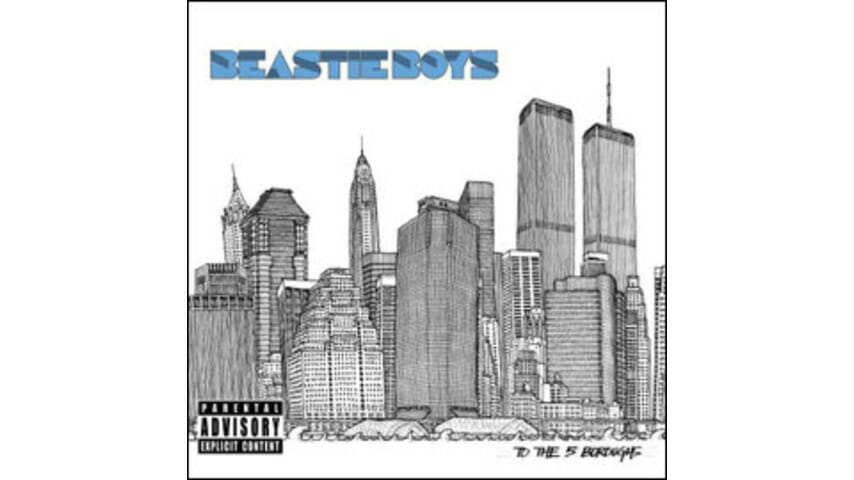Impossibly crowded skyline, dirty streets, high rent, yellow taxi fleets, miserable winter slush, celebrity mayor, Thanksgiving Day parade, Letterman, Wall Street. While most major metropolitan cities can claim at least a few of these characteristics, New York City has somehow transcended, become less metropolis and more localized cult religion (with attendant small-scale jingoistic tendencies). Where other cities’ ratty weeklies leave newsprint on your fingertips; NYC’s famous weekly—a pious, glossy little rag called The New Yorker—routinely fills mailboxes, confronting subscribers from Muncie to Munich with their pitiable outsider status. But only New York City—not Chicago, not L.A., not Atlanta—can boast the following title: cradle of hip-hop.
By the time the Beastie Boys (hailing from Manhattan’s Lower East Side) arrived on the scene in the early ’80s, initially as a hardcore-punk outfit, New York hip-hop pioneers like the Sugarhill Gang and Grand Master Flash had already lit the fuse of popular acclaim with their mega-hit singles “Rapper’s Delight” and “The Message,” respectively. The aesthetics of hip-hop, which crystallized in the late ’70s amid block parties in the projects of Harlem and the South Bronx, gave voice to a frustratingly invisible generation of African American youth growing up in the inner city.
Its practitioners had plenty to challenge in society (and often did, complementing the punk movement already underway), but many of hip-hop’s early jams were content to simply provide a cathartic, sweaty release through dance and funky-frivolous rhyming. Hip-hop would soon bring about a widespread awareness of ghetto life. It would only be a matter of time before the rest of the country finally took notice. This process accelerated significantly as hordes of suburban white teens began latching onto hip-hop’s sense of alienated discontent, putting the fear of Yaweh in politicians and fastidious parents alike.
The Beastie Boys’ foray into hop-hop with 1986’s License to Ill drew critical backlash for the group’s co-opting of black culture, though the practice had long since become its own art form. Elvis Presley made a career out of it, not to mention a certain Chuck Berry-worshiping mop-top quartet. Nearly 20 years removed from License to Ill’s release, capping a six-year hiatus since 1998’s Hello Nasty, the Beastie Boys have returned with To The 5 Boroughs, a funk-nasty ode to the B.I.G. Apple.
I’m happy to report that, with the exception of a few hairs now silver as the grille on an SM58, nothing about this group has changed. Boroughs succeeds on the same trademark cheeky genius characterizing all the Beasties’ previous releases. Adam “King Ad-Rock” Horovitz, Adam “MCA” Yauch (who introduces an even more hoarse, rough-edged attack) and Michael “Mike D” Diamond are still on a mission to disgrace “sucka MCs” with superior rhymes, beats and skillz. And they’re not going to rest until they’ve “turned the party out”—whether spitting arcane references from ’70s sitcoms in a manic lyrical assault (“Ch-Check It Out”) or using martial arts to “knock the mic right out your hand” (“3 The Hard Way”). This has always been the joy of listening to the Beastie Boys: the playfulness, the fun-lust, the infectious street-wiseass braggadocio.
The Beastie Boys’ music continues to trade on the Neverland fantasy cultivated in J. M. Barrie’s epic tale of the boy in green tights who wasn’t so much stunted as privileged. You can pay the utility bill or drive to pick up your kids from school while listening to this record, and vicariously experience the guilty pleasure of never being expected to act your age. These “Boys” are nearing 40 now, but they’re still dropping the same playground taunts (“don’t get slick ‘cause you used a corked bat to get those hits”) and party-hearty sentiment they were in 1986. Their genius lies in how effortlessly they can sell you on it. Bands like Wilco and U2 have been content to leave a trail of frustrated fans in their creative wake, perpetrating one sonic reinvention after another, but the Beastie Boys seem capable of delivering the same basic product in an endless variety of nuanced packages. You’ve got to admit: there’s something endearing about this level of reliability.
To The 5 Boroughs drops beats-and-flows reminiscent of old-school Run-DMC and Public Enemy, but the overt social consciousness of these artists (which always seemed conspicuously absent from the Beastie’s mix) has finally surfaced. You can only beat up on imaginary MCs so long before you need another target. Luckily for these guys, George W. Bush is an equal-opportunity punching bag. In “It Take Time To Build,” MCA raps, “Maybe it’s time we impeach Tex / And the military muscle that he wants to flex / By the time Bush is done, what will be left? / Selling votes like E-pills at the discothèque / Environmental destruction and the national debt / But plenty of dollars left in the fat war chest.” Similar sentiments appear elsewhere on the album (“George W’s got nothing on me / We got to take the power from he”), in addition to comments on America’s need for stricter gun control measures and increased cross-cultural unity.
While the Beastie Boys have serious issues with G-Dub, they’ve got nothing but love for the city they’ve called home all these years. The obvious centerpiece of the album, “An Open Letter to NYC,” paints an unabashedly affectionate portrait of New York, praising not only its various personally significant landmarks (“I’d go to Blimpie’s down on Montague Street and hit the Fulton Street Mall for the sneakers on my feet”), but also the diverse representation of humanity contained within its borders. In the wake of the 9/11 terrorist attacks, New Yorkers found themselves swept up in a frenzy of self-adulation, a natural coping mechanism in the wake of unthinkable violence. But while New York City hardly needs another song (or album) written in its honor, the Beastie Boys have crafted one that speaks, not just loudly, but with tremendous reverence. In a musical context that also has NYC to thank for its being.
